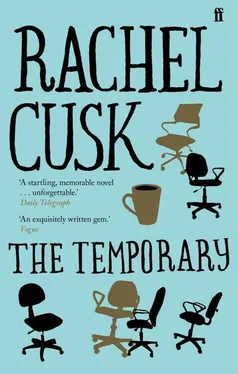Rachel Cusk - The Temporary
Здесь есть возможность читать онлайн «Rachel Cusk - The Temporary» весь текст электронной книги совершенно бесплатно (целиком полную версию без сокращений). В некоторых случаях можно слушать аудио, скачать через торрент в формате fb2 и присутствует краткое содержание. Год выпуска: 2013, Издательство: Faber & Faber, Жанр: Современная проза, на английском языке. Описание произведения, (предисловие) а так же отзывы посетителей доступны на портале библиотеки ЛибКат.
- Название:The Temporary
- Автор:
- Издательство:Faber & Faber
- Жанр:
- Год:2013
- ISBN:нет данных
- Рейтинг книги:5 / 5. Голосов: 1
-
Избранное:Добавить в избранное
- Отзывы:
-
Ваша оценка:
- 100
- 1
- 2
- 3
- 4
- 5
The Temporary: краткое содержание, описание и аннотация
Предлагаем к чтению аннотацию, описание, краткое содержание или предисловие (зависит от того, что написал сам автор книги «The Temporary»). Если вы не нашли необходимую информацию о книге — напишите в комментариях, мы постараемся отыскать её.
The Temporary — читать онлайн бесплатно полную книгу (весь текст) целиком
Ниже представлен текст книги, разбитый по страницам. Система сохранения места последней прочитанной страницы, позволяет с удобством читать онлайн бесплатно книгу «The Temporary», без необходимости каждый раз заново искать на чём Вы остановились. Поставьте закладку, и сможете в любой момент перейти на страницу, на которой закончили чтение.
Интервал:
Закладка:
‘Thanks very much, Roz,’ he said loudly. ‘I shall enjoy reading these.’
Roz was silent, but he saw a noisy blush begin to march across her cheeks. She sat still for a moment, as if waiting for something, and then began to tap at her keyboard. Ralph pushed the magazine discreetly to one side and stared at his empty desktop. He was tired, his limbs heavy with the residue of a fractious night filled with flickering half-dreams in which he had been visited hourly by the horrible succubus of fear. He had woken feeling smothered and his thoughts still sounded tinny and distant, like a radio playing in another room. Having no alternative, he had put on his life again like a set of old, grubby clothes, hating their smell and feel the more for having removed them. Now and again a fierce pain of recollection stabbed at his chest as memories of the night before struggled free of his attempt to suppress them.
‘How do you spell inflation?’ said Roz.
She was typing avidly, staring at the screen and sighing as she jabbed a finger at the keyboard to annihilate a word. Ralph watched her, faintly distracted by the rare sight of her industry. She pressed a button and then turned to gaze expectantly at the printer. It began to whirr, disgorging a single white sheet. She picked it up and turned back to her desk, mouthing the words and nodding her head as she read. Then, to Ralph’s surprise, she got up and walked in a half circle to his side of the desk, placing it squarely before him.
‘What’s this?’ he said.
She didn’t reply and he looked at the sheet of paper. It was a formal office memorandum, addressed to him, from Roz L. Corby. It was headed ‘Re: Sale of Magazines’. Ralph looked up, but Roz had disappeared. He turned back to the sheet of paper.
‘With regards to the copies of Auto Week which I delivered to you this morning, I would like to remind you of the matter of payment for these magazines. The charge will be as is on the cover, which when you consider the matter of inflation is less than you would pay for them these days!’
It was signed, ‘yours sincerely, Roz L. Corby’. Ralph put his head in his hands and began to laugh.
Fifteen
‘Can I talk to Gary?’ demanded an American voice.
It was mid-afternoon, a time of lassitude and meetings, and the office was half-empty.
‘He’s not here,’ snapped Francine, who found interruptions of languor even more irritating than those of occupation. ‘Call back later.’
Lorraine looked up from the neighbouring desk, her fingers petrified in the air above her keyboard. Francine felt her gaze loiter and then wander away.
‘I see,’ said the man sternly. ‘And what’s your name, little lady?’
‘Francine Snaith.’
Lorraine’s eyes were on her again, avid now with interest.
‘Well, Francine, do you always talk to your boss’s clients that way? Because if you do, I think he should know about it.’
‘Sorry,’ said Francine sourly.
‘You don’t sound too sorry,’ said the man. ‘What’s going on, Francine?’
‘I’m busy,’ Francine replied. ‘I haven’t got all day.’
‘Well, if you can find the time in your schedule, tell Gary that Harry Rosenthal wants to talk with him.’
‘Who was that?’ said Lorraine excitably when Francine put the phone down.
‘Harry Rosenthal,’ said Francine coolly. She could feel her legs shaking beneath her desk.
‘Mr Rosenthal ?’
Lorraine raised her eyebrows in pencilled astonishment and turned reluctantly back to her work, looking as if she were about to burst with the import of what she had just witnessed. Francine could see her shaking her head as she typed. She got up and made herself some coffee without offering to make any for Lorraine. It was still only three o’clock, but Francine was already straining with an almost uncontainable desire to leave the office. Mr Lancing was out for the afternoon and wouldn’t come in until the next morning, but Lorraine was watching her now, glancing vigilantly up from her screen every few minutes with the mistrustful aspect of a security guard. It would be impossible for her to leave unnoticed, and she had already gone home twice in the middle of the afternoon during the past week under the cover of illness and didn’t dare try it again. There were only two hours to wait before she could walk away free. Surely she could make them pass? She forced herself back into her chair and cast about for something to do. A tape recorded by Mr Lancing earlier in the day lay on her desk, awaiting transcription. Francine considered the possibility of typing it up, and felt her frame go limp at the prospect of something so laborious. Now that her sense of duty had run dry, she required not industry but entertainment to propel her through the long minutes. It had proved impossible, since that shrouded moment in which she had ceased to be interested in Lancing & Louche, to tame herself again into the habits of work, and her belief that she needed a change permitted the impulses of disruption to rule her in their stead. How could she be expected to carry on, when everything about the place now bored her? She needed excitement, variety! People didn’t look up any more when she came into the office — even Mr Louche no longer loitered at her desk — and Francine knew that, once extinguished, the quality of novelty could not be revived. Occasionally, faint warnings of a danger up ahead reached her ears, and when she heard them unpleasant anxieties crept across her thoughts. The agency would be angry with her if she lost this job. What if she didn’t find anything else? What if, when she dug into her resources, she found their seams exhausted, the future used up, all her luck gone? The idea was enough to induce panic, and Francine would try to struggle back into her harness, but in doing so she was faced with a still more disagreeable fate: her belief that she always deserved something better than that which she possessed was her engine, and without it she would surely grind to a halt. The thought of what might happen if she did filled her head with such noise that the sound of other perils was lost. She put Mr Lancing’s tape into the machine and switched it on. He had placed his mouth too close to the microphone, and when she put on her headphones she could hear his breath grating against her ears. She fixed her eyes on the screen and began to type.
At twenty past five Francine switched off the tape and started gathering her things. Mr Lancing’s letter dangled unfinished on the screen, but considering the effort she had gone to in making the gesture at all she felt it couldn’t be expected of her then to put herself out by staying late. Lorraine sat stolidly at her desk, as if she had no intention of going home. When she saw Francine rise from her chair, she looked at her watch. The telephone rang just as Francine was putting on her coat and she stiffened with impatience.
‘Miss Snaith? There’s a Stephen Sparks waiting for you in reception.’
‘For me?’ said Francine, not understanding.
‘That’s what the gentleman says.’
Francine put the phone down, her heart pounding with pleasure and fear. What was he doing here? As she stood the moment grew around her, glowing with significance. In it, the flavour of excitement, untasted for so long, deliciously returned. She had known he would come! There had been something between them at the party — all this time he must have been trying to find a way of seeing her alone! If only she hadn’t started things with Ralph, who knew what might have happened? The brutal thought that Ralph himself might have sent Stephen to talk to her stamped a sudden, heavy foot on her blossoming hopes. Would he have dared? The idea was disagreeable, and she took immediate action against it by ejecting it from her thoughts.
Читать дальшеИнтервал:
Закладка:
Похожие книги на «The Temporary»
Представляем Вашему вниманию похожие книги на «The Temporary» списком для выбора. Мы отобрали схожую по названию и смыслу литературу в надежде предоставить читателям больше вариантов отыскать новые, интересные, ещё непрочитанные произведения.
Обсуждение, отзывы о книге «The Temporary» и просто собственные мнения читателей. Оставьте ваши комментарии, напишите, что Вы думаете о произведении, его смысле или главных героях. Укажите что конкретно понравилось, а что нет, и почему Вы так считаете.












